
Benefits are important to just about every full-time employee – and, by extension, any business. What workers can depend on from their job, aside from a paycheck and fulfilling work, will strongly affect satisfaction and retention. A survey conducted by TechnologyAdvice found that 56 percent of employees considered benefits "moderately" or "very" important, and an equal share of those surveyed said they'd rather have certain perks than extra salary.
"56 percent of employees said they'd rather have certain benefits than extra salary."
When the time comes to change or update your business's benefit offerings – or, for startups, to select a provider in the first place – the process can seem daunting. But with the aid of a skilled benefits broker, it doesn't have to be. Let's take a look at what brokers offer and how to select the right pro for the job:
Broker offerings: An array of options and experienced counsel
Benefits brokers can either work exclusively with one insurance company or be independent and operate on commission, selling plans available from multiple providers. Frequently, brokers will come into your office and hold informative sessions for employees regarding what insurers offer, how prices may have changed and service differences between the current plan and new prospective coverage.
Brokers often also assist with the enrollment process and may even offer their time for one-on-one sessions with individual workers who have questions. Moreover, they may even offer cost-benefit analysis of your company's existing services.

Broker bona fides: Certification is key
All U.S. states and the District of Columbia require licensure to sell insurance, but beyond this basic requirement, certification is also important. The National Association of Health Underwriters, for example, should pop out to you on a potential broker's list of qualifications, particularly the Registered Employee Benefits Consultant designation. For more specific insurance backgrounds, check that the professional has corresponding credentials from NAHU or a similar organization.
Determining coverage prices
Agency-affiliated brokers frequently offer discounts that might not be available directly from the provider. An independent broker, meanwhile, is working on commission, and big sales are in their best interest. They are not tied to any one insurer and can present a wider range of options.
Going above and beyond
If you choose the right broker for your company, you can build a vendor-client relationship that lasts for years. Not only that, but the salesperson may also increase their involvement and provide consulting services, even after sales are made and new plans take effect. This might help mitigate the chances of any snags coming up between your company and the insurer, and help staff better understand their new benefits.
For more information about what to look for in a benefits brokers, check out our eBook 4 Characteristics of an Excellent Benefits Broker.